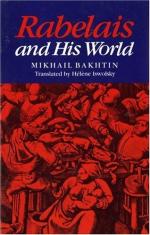
|
| Name: _________________________ | Period: ___________________ |
This quiz consists of 5 multiple choice and 5 short answer questions through Chapter 3, Intro. cont. & Chapter 1 - Rabelais in the History of Laughter.
Multiple Choice Questions
1. Bakhtin thinks that life is:
(a) Meaningless and futile.
(b) Organized by human acts of behavior and cognition.
(c) Inert, chaotic, and requiring the intervention of art.
(d) A sacrifice the soul makes to the body.
2. Clowns and fools are:
(a) Prisoners forced to entertain others.
(b) Restricted to entertaining the royal court.
(c) Present only at large fairs or gatherings.
(d) Everyday representatives of the folk and of Carnival.
3. After Rabelais' time, the use of laughter in literature and culture moved in which direction?
(a) From spiritual to earthly.
(b) From singular to universal.
(c) From universal to restricted.
(d) From accepted to encouraged.
4. What was the reception of Rabelais' work in the eighteenth century?
(a) His work was viewed as a revival of Classical writing.
(b) Other writers strove to emulate his style.
(c) Other writers used his topics as a jumping-off point for their own works.
(d) His work was viewed as unintelligible and barbaric.
5. Which answer best describes "grotesque realism"?
(a) The bodily element is universal, celebratory, positive, and exaggerated.
(b) The tone of the writing is always dark, Gothic, and depressing.
(c) The author's focus must be on bodily gore, blood, death, and dying.
(d) The writing must strive to be as mathematically or geometrically accurate as possible in its descriptions.
Short Answer Questions
1. What does Bakhtin find to be the greatest error other critics make in their studies of Rabelais' works?
2. In the seventeenth century, the decline of laughter as a primary force in folk culture resulted from:
3. How, according to Bakhtin, does the current Russian literary criticism approach Rabelais' works?
4. Bakhtin believes that novels are:
5. Bakhtin connects Medieval "seriousness" most closely to:
|
This section contains 391 words (approx. 2 pages at 300 words per page) |

|




